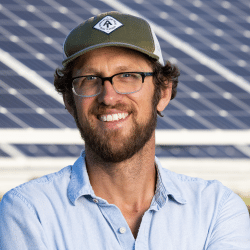Tobi believes that conventional farming is no longer a viable solution due to the economic, social and environmental implications surrounding it. He is convinced that nature-based solutions for agriculture are the most suitable alternative for small farmers. His methodology involves approaching a… Leer más
Tobi believes that conventional farming is no longer a viable solution due to the economic, social and environmental implications surrounding it. He is convinced that nature-based solutions for agriculture are the most suitable alternative for small farmers. His methodology involves approaching a community and making an assessment to identify the organic materials available there, the crops or livestock produced, and then he recommends the most suitable nature-based solution. He has been working mostly with the black solider fly, and also with crickets and wood pyrolysis for bio-fertilizers.
However, the most recommended nature-based solution Tobi uses is the black soldier fly due to its prevalence in Nigeria and Africa generally. The fly at its larval stage is a voracious eater and can eat any organic waste ranging from food, fecal matter and kitchen waste. Just a handful of larvae will convert 100 kg of waste into 20 kg of bio-fertilizer in 10 days (about one and a half weeks).
Farmers engaged in livestock farming need a minimum of 2 plots of land to cultivate and get 1 kg of protein-based soybeans for feed, but with the black soldier fly larvae they get the same amount of protein in a 5 by 10-meter space, meaning that farmers require less land to cultivate protein-rich feed for their livestock, thereby freeing up more land for other cash crops. Currently, due to the demand for livestock feed on soybeans, 80% of all soybeans produced in Nigeria go to livestock feed, leaving only 20% for human consumption. With Tobi’s solution, this trend is reversing.
Tobi and his team believe in and operate a proprietary method which he calls the D.E.A.L Method.
First, they Demonstrate the model to farmers in rural communities at their purpose-built demonstration sites. There he shows the farmers through a demonstrative process how the back soldier flies and crickets are reared.
Secondly, they allow the farmers to Experiment with the solution for themselves on their farms. He provides them with a 1-meter by 1-meter kit to get them started with experimenting on the model in their farms.
On the third step in the process Tobi and his team get the farmers to Adopt the method having experimented with it on their farms. For Tobi the adoption stage is the most important instance as this differentiates them from other organizations working with farmers who simply train and leave. At this stage, Tobi and his team work with these rural farmers for 6 months during which the farmers consolidate the model well enough to propagate it on their own without supervision.
Finally, Tobi and his team get the farmers to Leverage their new knowledge to take up other nature-based solutions that are found around them. This mindset shift has seen rural farmers move from wasteful practices, and reliance on industrial fertilizers to the adoption of nature-based solutions.
Tobi’s solution eliminates the need for fertilizers and reduces the use of pesticides and feed for livestock which in turn sees a 20% – 40% cost reduction for crop farmers. In terms of livestock farmers, 70% of the production cost is for feed, but with the black soldier fly methodology, poultry farmers can reduce their cost by 40%. This methodology requires no extra capital and lies within their capabilities. With the black soldier fly methodology, organic waste from the farms is used as an input for the flies and converted afterward to protein and bio-fertilizer with the final produce excreted by the larvae being environmentally friendly. This can be used as biofertilizer in the soil to enrich it and reduce water contamination and land degradation that comes from pesticides and industrial fertilizers. In addition to this, the fact that protein can be produced in less space reduces the need for land to cultivate protein for livestock feed, thereby reducing the need to clear more land for farming purposes.
Tobi has realized that providing farmers with a natural alternative that they get to own and experiment with, has given them ownership over their farming process, thus making the methodology scalable by leveraging the farmers in a peer network. In addition to this, Tobi secures 30% - 40% share for women in his nature-based methodology trainings as an economic alternative for them. After the training, the women start agricultural activities using this methodology and improving their economic conditions to take care of their homes and send their children to school. By this, Tobi is helping them increase their income by 40%.
In Nigeria, he has deployed the training and operations in 29 communities in Southwest Nigeria, covering around 1,200 farmers. He is also working in 24 communities in Northeast Nigeria, covering 2,400 farmers. His pilot facility has treated an estimated 15 tonnes of organic waste to date, whilst his adopting beneficiaries are treating an average of 100 kg of organic waste per month.
He is currently expanding his work to other countries, not operating directly but partnering with other organizations and using a train-the-trainers approach. In Kenya, he is partnering with WAWA Africa, Core Health and Wealth Initiative (CHW), and GAASPP, working in three communities. He is also in conversations with partner organizations in Uganda and Cameroon to replicate his nature-based solution.
Read less


